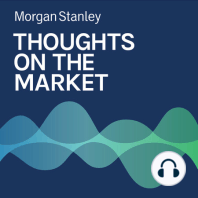3 min listen
James Lord: The Dollar’s Resiliency
ratings:
Length:
3 minutes
Released:
Jul 7, 2023
Format:
Podcast episode
Description
Though the debate around the global strength of the dollar in currency markets continues, the dollar’s current high yield in a world of weak global growth could help it appreciate----- Transcript -----Welcome to Thoughts on the Market. I'm James Lord, Morgan Stanley's Head of Foreign Exchange and Emerging Market Strategy. Along with my colleagues bringing you a variety of perspectives, today, I'll be discussing the status of the U.S dollar within global foreign exchange or FX reserves. It's Friday, July 7th, 3 p.m. in London. The debate about the dollar's status as the world's dominant currency usually resurfaces during every business cycle, and as our world increasingly transitions from globalized toward a multipolar model, this debate appears more relevant. Indeed, some economic actors are already de-risking their currency reserves away from the dollar, promoting the use of local currencies as an alternative in international trade and trying to reduce the dollar's global role through other means. Yet, this debate is usually a distraction from determining where the dollar is headed. In contrast to the popular narrative, we believe the dollar can appreciate, even if its use as a reserve currency or invoicing currency in international trade declines. Let's first address the dollar's status as the world's dominant central bank reserve currency. The purpose of FX reserves is to bolster the external stability of an economy and enable central banks to act as lenders of last resort to those in demand of foreign currency. It's intuitive to think that reserve choices might therefore be correlated with the value of currencies themselves, yet relying on that intuition would not have served you well in recent history. Case in point, while the dollar remains the world's dominant reserve currency, its share has dropped by around 20% over the last 20 years, most rapidly over the last ten. Nevertheless, over the last decade, the dollar has been one of the world's strongest currencies, with the Fed's real broad dollar index reaching a near 20 year high in October 2022. The dollar's declining share of global FX reserves has not been relevant in figuring out where the dollar is heading, in part because FX reserve managers are less influential in currency markets today, but more importantly, because other investors have favored U.S. assets. To be clear, this does not mean that watching trends in FX reserves is not important. A sudden, sharp decline in the market share of a reserve currency could well be driven by a sudden loss of confidence in the macroeconomic stability of an economy, diminishing its attraction as an investment destination. If so, the currency of that economy would likely decline. This concern has not driven the decline of the dollar's share of global FX reserves in recent years, as evidenced by its continued strength. Moreover, U.S. assets retain unique appeal for global capital, as the recent boom in U.S. tech stocks and rising optimism about the productivity enhancing implications of A.I show.Meanwhile, the dollar provides one of the highest yields of the world's major currencies, thanks to the Fed's hiking cycle. In a world of weak global growth, this yield will also likely help the dollar to appreciate. For clues about the future direction of exchange rates, we would be watching for signs that investment opportunities in different economies are improving. For now, the dollar offers attractive yields and remains a safe harbor during the current period of slow global economic growth. Thanks for listening. If you enjoy the show, please leave us a review on Apple Podcasts and share Thoughts on the Market with a friend or colleague today.
Released:
Jul 7, 2023
Format:
Podcast episode
Titles in the series (100)
Andrew Sheets: For Markets, Signs, Signs, Everywhere Signs by Thoughts on the Market
